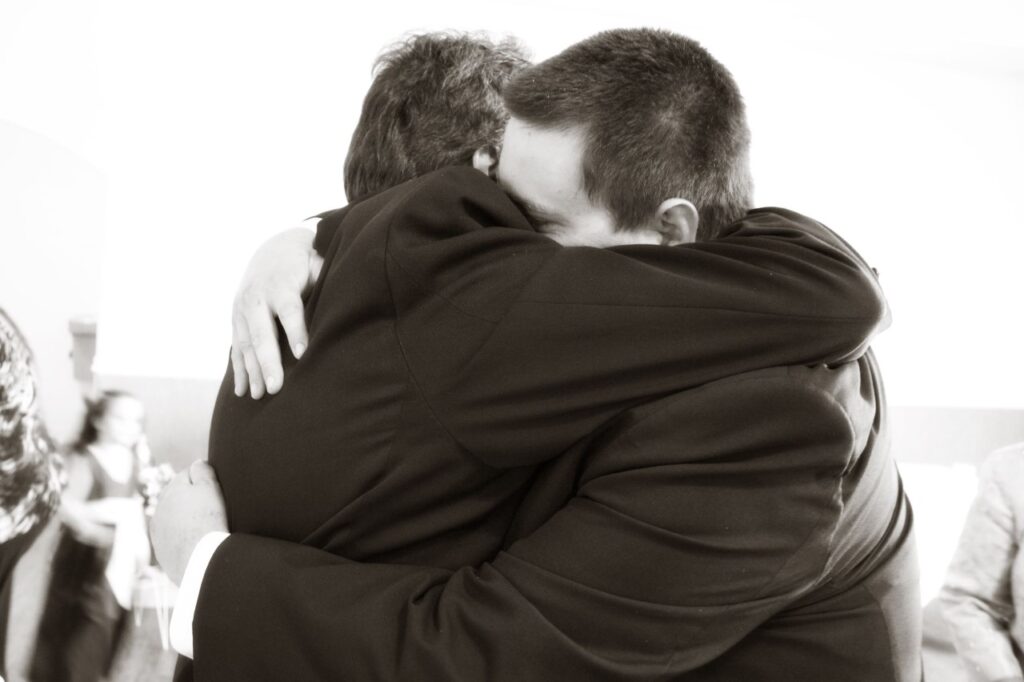
In my starving-grad-student days, I took money to let both men and women feel me up.
They were medical students, and I was to give feedback about their first, fumbling forays at a breast exam. What fascinated me was how different each attempt was. Some were tentative, some grabbier than a bad date, some so gentle I relaxed instantly, some so clammy and nervous I wanted to guide their trembling fingers.
Touch communicates.
It is often the fastest way to soothe, calm, or mend hurt feelings. And it heals. Your mother’s cool hand stroking your hot forehead or rubbing Vicks into your chest makes those first miserable colds bearable. When, at eighteen, I had surgery, I was surprised that a nice young man in scrubs wanted to hold my hand (and I was so uninhibited by the pre-surgery happy drug that I squeezed back with a little too much enthusiasm). But the hand-holding did more than let them know when I lost consciousness; it reassured and relaxed me, which was bound to ease my recovery.
Our hands are capable of showing love, making amends, erasing pain. Massage therapists talk about how the body holds trauma, and how the right kind of touch can release that tension, even loosen sobs and memories. Our skin is our largest and most vulnerable organ, its nerve endings only lightly veiled. We only know a raindrop is wet because our brain triangulates between touch and temperature; it has no wetness sensor per se. Touch reveals the world to us—and we crave its reassurance.
Humans are not special; many species hold their babies close, and young creatures play-wrestle or nap in a warm heap. Lions cuddle to strengthen bonds within their pride. Sea otters hold hands to keep from drifting away from the group.
Aristotle called touch the most universal of the senses, wrapping around both mind and body. All the other senses work by some form of touch, he pointed out, striking our receptor cells with light, sound, flavor, or fragrance.
Just look at our language: We say something is “touching” when it “takes hold of us,” “grabs us,” “moves us.” We say, “I feel you” when we understand and empathize. We talk about someone having the right touch, the magic touch, the personal touch. The immortal phone company slogan urged us to “reach out and touch somebody,” and maybe it stuck, because now even in the business world we “reach out” when we need to contact someone.
Kids learn “bad touch”; I wonder what they make of that. The younger they are, the more urgently they need good touch. In the thirteenth century, the evil (I do not use the word lightly) King Frederick of Germany isolated babies, forbidding their nurses to speak to them or touch them. He wanted to see what language they developed on their own; he felt sure it would be German.
He never found out—because they died.
In the 1960s, Harry Harlow raised baby monkeys in total isolation for three, six, or twelve months. Returned to a social setting, they huddled in a corner and rocked back and forth, not interacting in any way.
Why does old cruelty matter now? Because technology is removing us from the sensible world in so many ways. We sit alone in front of a screen for large swaths of the day, and services that used to be interactive are now automated. During COVID’s general quarantine, people who lived alone got pretty close to rocking in a corner. Denied handshakes and hugs, they wobbled along in a transparent bubble, isolated and desperately lonely. Every third person got a puppy; never have we leaned so hard on our canine friends. Forget guarding the campfire; it is the cuddling, the nuzzling, the leaping attempt to bathe us with kisses that we need from them.
I remember how excited I was, years ago, by the advent of touch screens. I even liked saying the phrase. It seemed to promise a technology that was softer, better suited for human use. But it did not play out that way, and I was naïve to equate, even unconsciously, a slide of the fingertip across slick or smudged glass with the kind of touch that validates and reassures.
Now I read about fingerprint biometrics and haptics and shrug; there is no warmth to this sort of touch. In his new book, Touch: Recovering Our Most Vital Sense, Richard Kearney is marginally less cynical. He agrees with Aristotle that “touch is the most intelligent sense, because it is the most sensitive. When we touch something, we respond to what is touched.” Kearney looks at today’s technological landscape and concludes that “spectacle has swallowed the senses.” But he holds out hope for the new haptotechnology—vests and VR devices that will let us feel, virtually, what another human, or maybe even a tree, is feeling. That kind of technology can collude with embodied experience, he says, rather than overpower it.
I would like very much to know what a tree is feeling. But I would hate to forget how to rub my hands against its rough bark or (go ahead, judge me) hug its trunk. Our way of life has tugged us away from our bodies (maybe this is why I snack so much at the computer?) and that makes it hard to stay “in touch”—with our deepest feelings and with each other.
Read more by Jeannette Cooperman here.
